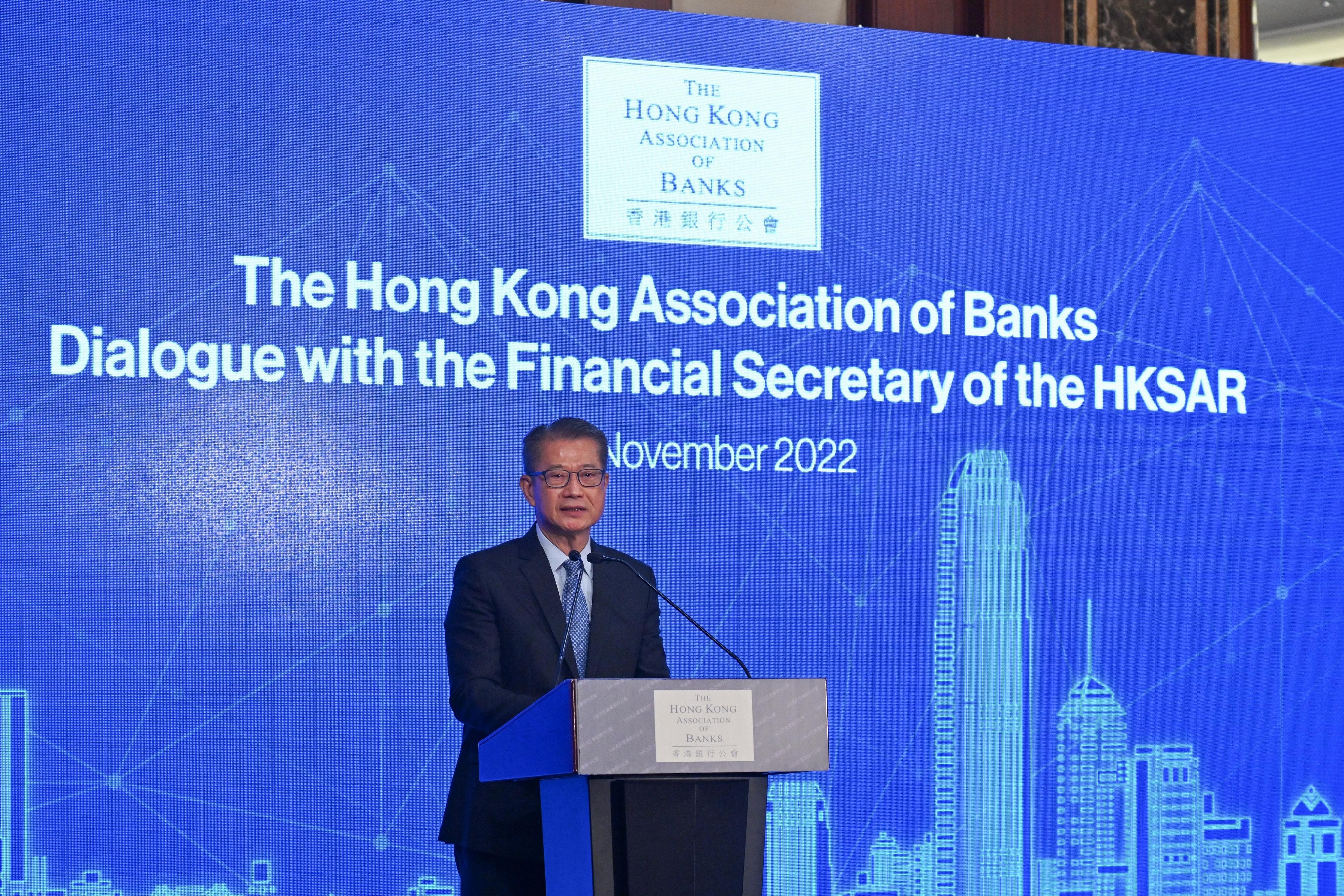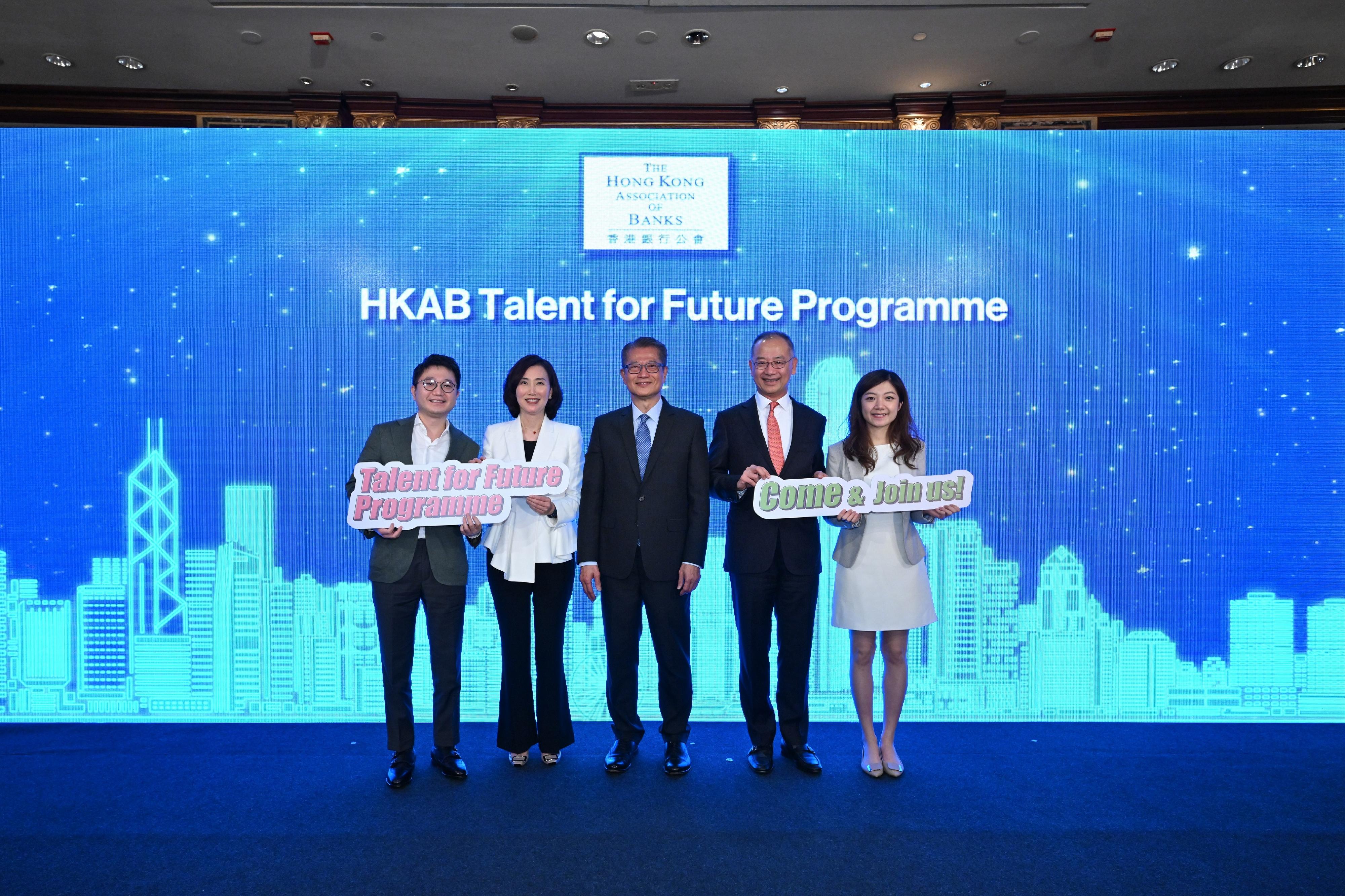Speech by FS at HKAB Dialogue with FS of HKSAR and Launch Ceremony of HKAB Talent for Future Programme (English only) (with photos/video)
Following is the speech by the Financial Secretary, Mr Paul Chan, at the Hong Kong Association of Banks (HKAB) Dialogue with the Financial Secretary of the HKSAR and the Launch Ceremony of HKAB Talent for Future Programme today (November 25):
Mary (Chairperson of the HKAB, Ms Mary Huen), Eddie (Chief Executive of the Hong Kong Monetary Authority, Mr Eddie Yue), Chris (Secretary for Financial Services and the Treasury, Mr Christopher Hui), distinguished guests, ladies and gentlemen,
Good afternoon. It is a great pleasure to join you at this event. I would like to thank the Hong Kong Association of Banks for inviting me to speak to some of the brightest and most successful leaders in our financial sector.
Our banking sector is clearly our pride and a gem in contributing to Hong Kong's status as an international financial centre (IFC). We are, after all, one of the world's largest international banking centres. By our latest count, 77 of the top 100 global banks are operating in Hong Kong. At the end of August, our banking system was holding assets to the order of HK$27 trillion, about 9.5 times of our GDP (Gross Domestic Product) in 2021. The robustness and stability of our banking system are also reflected by the capital adequacy ratio, liquidity ratio as well as classified loan ratios – all these compare very favourably with international standards.
In fact, Hong Kong is a major contributor to the profitability and assets of several global, systemically important banks. Earlier this year, the IMF (International Monetary Fund) commended Hong Kong on the continuing strength of our banking regulation and supervision. That commendation is as much yours as it is Government's.
The strength of our banks and our role as IFC are all the more echoed at the Global Financial Leaders' Investment Summit. The three-day Summit was a resounding success with over 200 top-notch participants from around 120 international financial institutions. It is a testimony to the value, opportunities and business prospects offered by Hong Kong. The Summit has sent a powerful message to the world that Hong Kong is back. And we are much heartened by the fact that many international financial institutions have indicated to us that they are planning to upscale their operation here, send more senior global executives and increase local hiring.
Looking to the future, I am very optimistic and confident about Hong Kong as a banking centre and our IFC status, for a number of reasons. First, the National 14th Five-Year Plan and the Outline Development Plan for the Guangdong-Hong Kong-Macao Greater Bay Area all support Hong Kong in enhancing our status as an IFC, and in particular, strengthening our role as an offshore Renminbi hub, international asset management centre, risk management centre, green finance centre, etc. And we will be playing a leading role in the financial co-operation in the Greater Bay Area.
Second, strong support by our country to maintain Hong Kong’s distinctive status and advantages under the "one country, two systems" principle. These advantages have allowed Hong Kong to continue to count on our singular role as a bridge between the Mainland and the rest of the world. President Xi, while attending celebrations of the 25th anniversary of Hong Kong's return to the motherland, reaffirmed that the "one country, two systems" principle is to be adhered to in the long run. That assurance was reaffirmed in the 20th National Congress of the Communist Party of China.
Third, the world is undergoing changes unseen in a century. The centre of economic gravity is shifting eastward. According to economists, Asia now contributes over 60 per cent of global economic growth; and China alone contributes around 30 per cent. Hong Kong is strategically located at the centre of Asia, and major Asian cities can be reached within a five hours' flight from the Hong Kong International Airport. We are familiar with the Asian markets, economies, culture, and possess an extensive people-to-people network. These unique advantages have enabled us to serve both international and Mainland investors and enterprises seeking opportunities in this region.
In fact, during my visits to the Middle East and Indonesia, I have felt the strong need and desire by governments and their enterprises in the region to explore the business opportunities in this part of the world, particularly the Mainland, and the Greater Bay Area. Hong Kong, as an international financial and business centre, is bound to benefit.
Fourth, Hong Kong is also determined to contribute to and benefit from the continuous reform and opening up of Mainland's financial sector, taking full advantage of our unique and special intermediary role. We serve as an important conduit in this process: on the one hand, with our world-class financial and professional services, market infrastructure, and financial talents and professionals, we are best positioned to link the Mainland market and international capital, and vice versa, and assist in the internationalisation of the Renminbi. On the other hand, we serve as a testing ground and firewall – mitigating or even preventing foreign market risks from transmitting to the Mainland market. Indeed, over the past few years, the Connect schemes are expanding and deepening. The recent additions of the MSCI A50 Connect, Bond Futures Connect and interest rate Swap Connect, are just examples of offshore risk management tools valued by investors participating in the Mainland equity and bond markets. It demonstrates the growing confidence and trust in the role of Hong Kong by the Mainland authorities as well as global investors.
Finally, the new-term Government is determined to grasp this historic opportunity that Hong Kong is entering a new phase, from stability to prosperity. It is a time when we must rise, become more proactive, and strive for better prospects of our future, our economy and the livelihood of our people.
That is why we have transformed our governance philosophy, seeking to combine the strengths of a proactive and capable government, and an efficient market. We are playing a much more catalytic role to create strong impetus of growth for Hong Kong.
In his maiden Policy Address, the Chief Executive announced a number of bold measures to attract enterprises and talents. We are in the process of setting up an office, a dedicated office, in abbreviation we call it OASES (Office for Attracting Strategic Enterprises), to attract enterprises that are of strategic importance and value to Hong Kong. We have set aside a sum of HK$30 billion to help us to realise this goal. On talents, much more aggressive talent admission schemes are being rolled out to get the right talents to power our economic engine. We will continue to push for the development of innovation and technology in Hong Kong, including providing the requisite land and infrastructure.
A recent example of our proactive governance style is the recent publication of a policy statement on virtual assets (VAs). We recognise that VAs, cryptos, etc are unstoppable new financial innovations. We need to embrace them. We therefore set out our vision for VAs to enable this sector to thrive in Hong Kong, progressively and sustainably.
We have pledged to explore financial innovation together with the global VA community. Indeed, we have also proposed a number of projects, including the tokenised offering of a new tranche of green bonds for institutional investors. Meanwhile, the Hong Kong Monetary Authority is also studying e-HKD, which may serve as the backbone, linking fiat currencies with VAs, and facilitate more innovations in this space.
We are keenly aware of the risks of VAs on financial stability, consumer protection, as well as money laundering and terrorist financing. The collapse of certain cryptos and recent bankruptcy of certain major VA exchanges are causing concerns.
Our regulatory approach is "same business, same risk, same rules". In the coming months, we will roll out a new licensing regime for VA services providers. Operators will be subject to regulatory requirements similar to those of traditional financial institutions, including compliance with the anti-money laundering and counter-terrorist financing and investor protection requirements.
In short, on VAs, we aim to actively promote technological innovation and application, while ensuring the risks are appropriately managed. We need to make full use of the potential of innovative technologies, but at the same time guard against the volatility and potential risks that they may cause, and the transmission of these risks and impact to the real economy.
Ladies and gentlemen, finally, please allow me to say a few words on financial talents. With all the bright prospects of our IFC development and the future it promises, we need to focus on people to power the whole industry. More talented professionals eager to change the world of finance.
I am therefore delighted to learn that the Hong Kong Association of Banks is commencing your Talent for Future Programme and has produced a series of videos to showcase the tremendous opportunities that the industry offers to young talents from diversified backgrounds.
Let me conclude with a simple message to our young talents out there: The banking industry wants you and Hong Kong needs you.
Last but not least, my thanks to the Hong Kong Association of Banks for organising this event, and for your continuing efforts for our financial services sector and the people of Hong Kong. Thank you.

